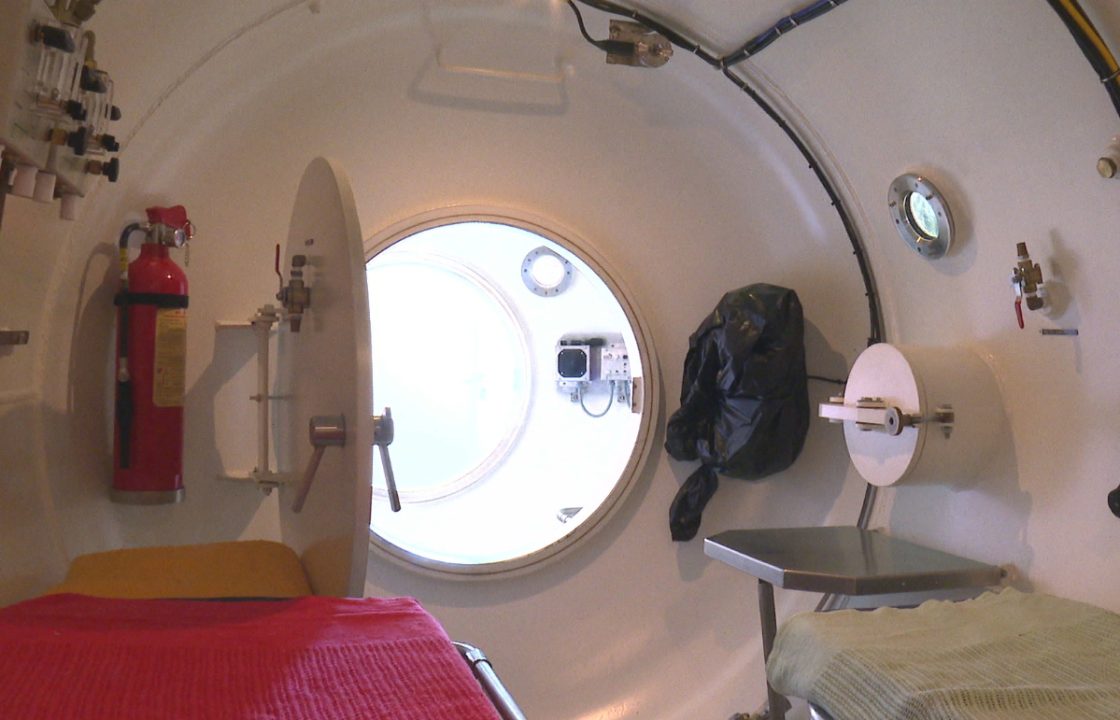SCOTLAND
Divers exploring the waters off Oban now have to travel to Aberdeen if they require treatment following closure of the Dunstaffnage facility.

Hyperbaric chamber in Oban opened in the 1970s.
Caitlin Hutchison
A hyperbaric chamber that has served the diving community on the west coast of Scotland since the 1970s has had its funding pulled.
The facility at Dunstaffnage near Oban has treated over 400 divers for decompression illness over the years – but now patients will have to travel to Aberdeen if they are to receive treatment for a condition that can result in paralysis or even death.
The wrecks and reefs in the waters near Oban make the area a mecca for diving enthusiasts. But another big draw for divers is the state-of-the-art hyperbaric chamber – one of only three in Scotland and the only NHS registered chamber on the entire west coast.
It saved Jessica Giannotti’s life ten years ago after a diving accident that left her gravely ill.
She told STV News: “My suit filled with air and I was shot to the surface. It was in the middle of a storm and I had to swim for 45 minutes to shore.
“I was quite scared because I thought I was having some sort of neurological illness and I felt like I was losing control of my body.
“I lost my balance, I couldn’t speak properly, I was just terrified in that moment but luckily I was treated at the hospital. They called me an ambulance and it took me straight away to the chamber.
“After two treatments, I started writing my name again, I could control my body, my bowels, I could start walking properly.”
The most severe cases of decompression sickness can result in paralysis or even death – so speedy treatment is crucial.
But with services at Dunstaffnage currently shut down after NHS Grampian withdrew funding, divers who become unwell now face a journey to Aberdeen.
Since it opened in the 1970s, more than 400 people have been treated at Dunstaffnage, and while the number of patients may be relatively low, the local diving community has serious concerns about the major impact that any potential delays to treatment could have.
Jonathan Sayer-Mitchell, director at Tritonia, a firm that undertakes underwater research and development, said: “Diving at work regulations recommend two to six hours for time to a chamber, so if we were operating on Mull or Tiree, or one of the outer isles, to get to Aberdeen in less than six hours is going to be a challenge.
“So there’s potential legal implications for the diving companies, there’s potential health implications for the divers.”
Companies like North West Marine, who provide professional diving services to a variety of businesses in the area, are now having to reassess.
Tony Ratcliffe, managing director at Jifmar Scotland, which owns North West Marine, said: “One of the things that we’re looking at is establishing our own chamber here to give chamber cover in the area to our divers.
“We’re looking into the costs but it’s probably going to be in excess of £500,000 – we don’t really want to go down that line.
“We were very happy with the service at the chamber at Dunstaffnage and to us it’s a big loss.”
NHS Grampian says there are well-established transport links in place to manage transfers to Aberdeen.
But with more than 10,000 signatures on a petition calling for the decision to be reversed, pressure on the health board is mounting.
Follow STV News on WhatsApp
No comments:
Post a Comment